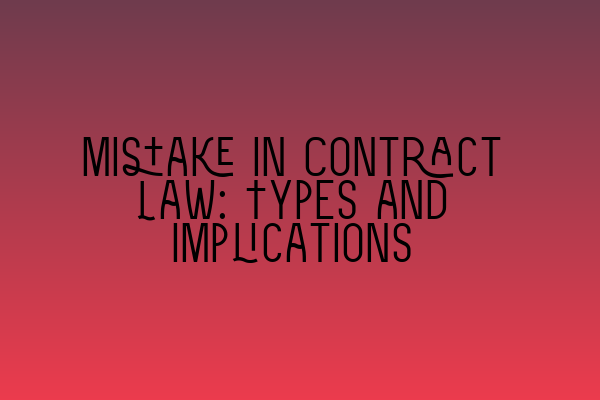Mistake in Contract Law: Types and Implications
In the world of contract law, mistakes can occur, leading to significant consequences for the parties involved. Understanding the different types of mistakes and their implications is essential for solicitors and individuals navigating the complex landscape of contract law. In this article, we will explore the various types of mistakes that can arise in contract law and the potential implications they may have.
1. Unilateral Mistake:
One type of mistake that can occur in contract law is a unilateral mistake. This occurs when only one party to the contract is mistaken about an essential element of the agreement. For example, suppose a seller mistakenly lists the wrong price for a product on an online platform. In that case, they may argue that a unilateral mistake has occurred, and the contract should be voided or revised. However, the implications of a unilateral mistake can vary depending on the circumstances and applicable laws.
2. Mutual Mistake:
A mutual mistake, on the other hand, occurs when both parties to the contract are mistaken about a material term or element of the agreement. In such cases, the contract may be voided or reformed if the parties can show that there was no true meeting of the minds. For instance, if both the buyer and seller mistakenly believe that the product being sold is made of a certain material when, in fact, it is not, the contract may be considered void due to a mutual mistake.
3. Mistake as to Identity:
Another type of mistake that can arise in contract law is a mistake as to identity. This occurs when one party enters into a contract with someone they believe to be a certain individual or entity, but it turns out that they have contracted with someone entirely different. For example, if a person believes they are entering into a contract with XYZ Corporation but later discovers that it was actually ABC Corporation, they may argue that a mistake as to identity occurred, potentially leading to the contract’s invalidation.
4. Mistake as to Subject Matter:
A mistake as to the subject matter of the contract can also have significant implications. This type of mistake happens when the parties are mistaken about the nature or existence of the subject matter in question. For instance, if a buyer enters into a contract to purchase a specific piece of artwork, but it turns out that the artwork was destroyed before the contract was formed, a mistake as to subject matter may arise, potentially rendering the contract unenforceable.
It is important to note that the implications of mistakes in contract law can vary depending on jurisdiction and the specific circumstances of each case. The courts will consider factors such as the materiality of the mistake, whether there was a reasonable opportunity to discover the mistake, and the impact on the parties involved.
To gain a better understanding of the practical implications of mistakes in contract law, it is helpful to explore real-life case studies and insights into legal practice and decision-making. For further information on this topic, read our article, “Unveiling Real-Life Case Studies: Insights into Legal Practice and Decision-Making.”
Additionally, understanding the process of becoming a solicitor and securing training contracts can help aspiring legal professionals navigate the complexities of contract law and avoid potential mistakes. Check out our article, “Securing Training Contracts: A Roadmap to Becoming a Solicitor,” for valuable insights and guidance.
The average earnings and factors affecting income for solicitors in the UK are also relevant to consider when venturing into the legal field. Learn more about solicitor salaries and the factors that can impact your earning potential in our article, “Exploring Solicitor Salaries in the UK: Average Earnings and Factors Affecting Income.”
For those interested in pursuing a legal education in the UK, it is crucial to choose the right path that aligns with your aspirations and future goals. Read “Pursuing a Law School Education in the UK: Choosing the Right Path for Your Future” to gain valuable insights and guidance on the various educational options available.
Finally, mentorship can play a vital role in nurturing talent and success in the legal field. Explore the benefits of mentorship for aspiring solicitors and the opportunities available in our article, “Mentorship for Aspiring Solicitors: Nurturing Talent in the Legal Field.”
In conclusion, mistakes in contract law can have far-reaching implications, depending on the type of mistake and the specific circumstances involved. Solicitors and individuals alike must familiarize themselves with the different types of mistakes and the potential consequences they may carry. By seeking knowledge, staying informed, and exercising due diligence, it is possible to navigate the complexities of contract law and uphold the principles of justice and fairness.
